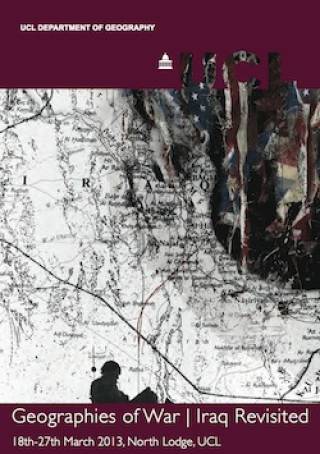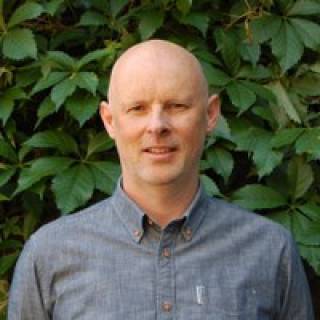Alan Ingram is a political geographer whose research examines the ways in which geopolitical events are constituted and contested as matters of public and political concern. His work explores how diverse actors frame and enact geopolitical events within particular political, aesthetic and material practices and considers their wider implications.
His 2019 book Geopolitics and the Event: Rethinking Britain's Iraq War Through Art is published in the Royal Geographical Society-Institute of British Geographers Book Series. Reviewed in the AAG Review of Books, in Geopolitics and in Space and Polity. The book was 'Highly Commended' by the 2022 RGS-IBG Political Geography Research Group Book Prize.
- More About Professor Ingram
Alan Ingram was educated at St Catharine's College, Cambridge, where he obtained a BA (1993) and PhD (1998) in Geography. He was a Research Associate of the Post-Soviet States in Transition Programme at the University of Cambridge from 1998 and 1999, and taught at the LSE from 1998 to 1999 and at Sidney Sussex College, Cambridge and the Department of Geography, University of Cambridge from 1999 to 2001. He joined UCL in 2004 after working outside academia in the field of global health policy.
Ingram's research has been supported by the Leverhulme Trust, the Economic and Social Research Council and the British Academy. He has published numerous articles in peer-reviewed journals including Transaction of the Institute of British Geographers, Political Geography, Geopolitics, Annals of the Association of American Geographers and Security Dialogue. In 2009 he published Spaces of Security and Insecurity: Geographies of the War on Terror, co-edited with Klaus Dodds. In 2011 he was awarded a British Academy Mid-Career Fellowship and in 2013 curated the exhibition Geographies of War: Iraq Revisited supported by a UCL Beacon Bursary for Public Engagement. His 2019 book Geopolitics and the Event: Rethinking Britain's Iraq War Through Art was published in the Royal Geographical Society/Institute of British Geographers Book Series.
Ingram's career has also been distinguished by his support for postgraduate research and early career scholars. As Secretary of the Political Geography Research Group of the Royal Geographical Society from 2008 to 2011 he helped to initiate biennial research group workshops fostering early career scholarship and having served as Department Graduate Tutor at UCL Department of Geography from 2013 to 2016, he was appointed in 2020 as Vice Dean for Postgraduate Research and Faculty Graduate Tutor in Social and Historical Sciences.
Praise for Geopolitics and the Event: Rethinking Britain's Iraq War Through Art
'Geopolitics and the Event is an enthralling survey of the response to the Iraq war both by Iraqi and non-Iraqi visual artists that is brimming with insight on every page. I have no doubt this book will become an essential reference for anyone researching or thinking about the catastrophe of the Iraq War and the sanction years.' - Hassan Abdulrazzak, Iraqi-British playwright
'In this timely and thought-provoking book, Alan Ingram asks us to consider how Britain's war in Iraq has been encountered, appropriated and reworked through art works, by artists and through exhibition practices. Geopolitics and the Event offers us a systematic exploration of how artistic enactments challenge the dominant logics of the Iraq war, and prompts us to rethink this significant geopolitical event.' - Rachel Woodward, Professor of Human Geography, Newcastle University
'Geopolitics and the Event contributes to the field of political geography by expanding existing geopolitical understandings of events, art, and the Iraq War. This book provides important groundwork for future work in political geography on the histories and spaces of war and the relationships between geopolitics and art.' - RGS Political Geography Research Group Book Prize
- Teaching
I teach on the following modules:
- Global Events (GEOG0015)
- Political Geography and Geopolitics (GEOG0025)
- Geopolitical Events (GEOG0056)
- Advanced Geopolitics (GEOG0086)
- Publications
To view Professor Ingram's publications, please visit UCL Profiles:
- Research Interests
Alan Ingram's research examines the ways in which geopolitical events are constituted and contested as matters of public and political concern. His work explores how diverse actors frame and enact geopolitical events within particular political, aesthetic and material practices and considers their wider implications.
Ingram’s research has focused on three major events and divergent responses to them. His early career work examined how, in the wake of the collapse of the Soviet Union, Russian nationalists and geopolitical theorists pursued the idea that Russia was a divided nation involved in an existential struggle with the West in ways that helped to set the stage for future tensions and conflicts.
His second main research project explored the geopolitical and security implications of emerging infectious diseases, focusing on the contrasting ways in which activists and policymakers in Britain and the US framed the HIV/AIDS pandemic as an exceptional event requiring exceptional responses and assessing the consequences of these framings for domestic and global health politics.
More recently, his research has examined how artists, curators and activists have reframed Britain’s role in the 2003 Iraq war, highlighting the ways in which their work has formed critical and creative counterpoints to official accounts, inquiries and memorials and opened up new ways of engaging with this event. Drawing on this research, his 2019 book Geopolitics and the Event: Rethinking Britain’s Iraq War Through Art maps out new ways of thinking about geopolitics, art and events in relation to each other.
Ingram's current research extends his interest in how knowledge about geopolitical events is constituted and contested via public practices, with particular reference to relations between Russia and Britain and wider concerns about the politics of truth and the fate of the West.
- Impact
- In March 2013 Ingram curated the exhibition Geographies of War: Iraq Revisited, which explored how artists from Iraq and Britain responded to the war by engaging with questions of space, place, landscape, home and territory.

The exhibition was accompanied by artists' talks and public engagement workshops exploring different experiences of the war and responses to it, organised in collaboration with the Mosaic Rooms, Ark Artist Space and Reel Festivals and supported by a UCL Public Engagement Beacon Bursary.
The exhibition was reviewed in Trebuchet Magazine. In the period surrounding tenth anniversary of the invasion Ingram contributed to public panels discussing art and culture in relation to the war (Reel Iraq 2013). Further public events included a 2014 panel on Threads of Light/Al-Mutanabbi Street Starts Here at the Mosaic Rooms and an evening of Iraqi poetry and theatre at UCL as part of the Al-Mutanabbi Street Starts Here Coalition, also in 2014.
- Research Students
Current
- Catriona Gold. "Don't be an 'Ugly American'": the US Passport Office and Cold War government of travel, 1955-77. Funded by ESRC 1+3 studentship.
- Martina Fisk. The Geo-politics of Carbon Accounting. Funded by ESRC +3 studentship.
Completed
- Lioba Hirsch. Quarantine: lived experiences of disease, spatial exclusion and embodiment in West Africa. Funded by Heinrich-Böll-Stiftung PhD Scholarship and a UCL Graduate Research Scholarship for Cross-Disciplinary Training. PhD awarded 2020.
- Charlotte Whelan. Experimental art practices and alternative political spaces in Bosnia and Herzegovina. Funded by ESRC +3 studentship. PhD awarded 2017.
- Ophélie Véron. Deconstructing the divided city: identity, power and space in Skopje. Co-supervision with Dr Ger Duijzings, SEES. PhD awarded 2015.
- Sam Halvorsen. Subverting space: territorial practices and territoriality in the Occupy London movement. Funded by ESRC +3 studentship. PhD awarded 2015.
- Cinzia Polese. Negotiating power between civil society and the state: the formulation of asylum policies in Italy and the United Kingdom. Funded by ESRC studentship. PhD awarded 2013.
- Nick Megoran. The Borders of Eternal Friendship? The politics and pain of nationalism and identity along the Uzbekistan-Kyrgyzstan Ferghana Valley boundary 1999-2000. Funded by ESRC studentship. PhD awarded 2002.
 Close
Close


